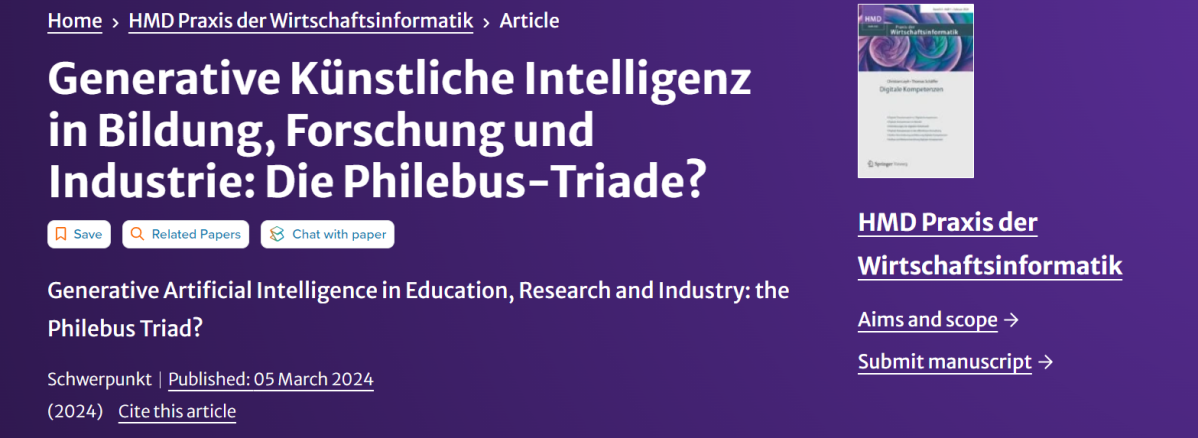Cowin, J.B. Generative Künstliche Intelligenz in Bildung, Forschung und Industrie: Die Philebus-Triade?. HMD (2024). https://doi.org/10.1365/s40702-024-01055-6
Zusammenfassung
Platos Dialog „Philebus“ erforscht ausführlich die Theorie der Formen und die Suche nach Wahrheit durch philosophische Diskussionen zwischen Sokrates und Philebus. Zentrale Prinzipien beinhalten das Erreichen eines Gleichgewichts zwischen Weisheit und Vergnügen, was Sokrates als Weg zum „guten Leben“ argumentiert. Dieses Papier stützt sich auf den philosophischen Rahmen der Philebus-Triade als Linse, durch die die Schnittstellen und Synergien zwischen den drei Bereichen Weisheit, Vergnügen und dem guten Leben betrachtet werden. Durch die Verwendung dieses philosophischen Modells, versucht die Autorin, die Komplexitäten und das Chaos einer beschleunigenden, unkontrollierten und unerforschten technologischen Evolution zu interpretieren und zu durchdringen. Ihre These argumentiert, dass die generative Künstliche Intelligenz (KI), betrachtet durch die Philebus-Triade – ein Konzept aus den platonischen Dialogen, das eine harmonische Verbindung zwischen verschiedenen Aspekten der Realität symbolisiert – einen zusammenhängenden Rahmen darstellt. Die Autorin stellt eine komplexe Verbindung zwischen den zentralen philosophischen Grundsätzen in den platonischen Dialogen und den möglichen Konsequenzen einer atavistischen generativen KI in den Bildungs-, Forschungs- und Industriesektoren her. Durch die Verknüpfung dieser Konzepte entsteht eine Reflexion über die Konvergenz von philosophischem Gedankengut und modernster Technologie. Die Synthese dieser Ideen unterstreicht die zeitlose Natur der philosophischen Untersuchung, um dringende Fragen unserer technologischen Ära zu beantworten.
Schlüsselwörter: Philebus-Triade · Platonischer Dialog · Atavistische Generative KI · Philosophisch-technologische Konvergenz
Abstract:
Generative Artificial Intelligence in Education, Research and Industry: the Philebus Triad? Abstract Plato’s dialog “Philebus” explores in detail the theory of forms and the search for truth through philosophical discussions between Socrates and Philebus. Central principles include achieving a balance between wisdom and pleasure, which Socrates argues is the path to the ‘good life’. This paper draws on the philosophical framework of the Philebus Triad as a lens through which the interfaces and synergies between the three areas of Wisdom, Pleasure, and the Good Life are viewed. By using this philosophical model, the author attempts to interpret and penetrate the complexities and chaos of an accelerating, uncontrolled and unexplored technological evolution. Her thesis argues that generative Artificial Intelligence (AI), viewed through the Philebus triad—a concept from the Platonic dialogues that symbolizes a harmonious connection between different aspects of reality—represents a cohesive framework. The author establishes a complex link between the central philosophical principles in the Platonic dialogues and the potential consequences of atavistic generative AI in the education, research and industrial sectors. By linking these concepts, a reflection on the convergence of philosophical thought and cutting-edge technology emerges. The synthesis of these ideas underscores the timeless nature of philosophical inquiry to answer pressing questions of our technological era.
Keywords: Philebus Triad · Platonic Dialogue · Atavistic Generative AI · Philosophical-Technological Convergence

